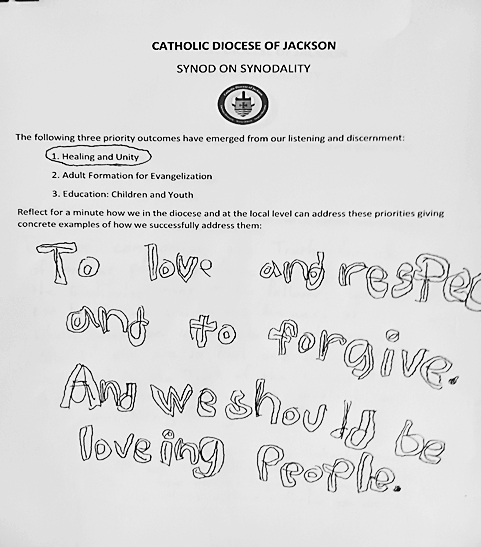KNEADING FAITH
By Fran Lavelle
The Synod on Synodality is forming and informing the work of the diocese as we continue to recover from the pandemic. Being a self-confessed overthinker, the implications about what we are hearing has my mind and heart working overtime. Yes, I am at the point of sleeping with a notepad next to the bed to write things down in the middle of the night lest I forget them by morning. There is much work to be done for sure. While our process has highlighted the challenges facing the church, it has also revealed a great hope that is palatable but energizing and exciting.
Our Synod Advisory Council spent a Saturday last month combing through the individual responses from the parishes. A common thread throughout the responses be it Anglo, Hispanic, African American, or youth is a call for unity and healing. Literally the Body of Christ is suffering from divisiveness and indifference toward the other. The question remains, how do we come back together under the four marks of the church – One, Holy, Catholic, and Apostolic? It is a behemoth task, but it can and must be undertaken for the good of all God’s people.

In our regional listening sessions with Bishop Kopacz, we have been asking people to give us concrete ideas on how we can truly heal and restore unity.
Sometimes in the United States we can be a little egocentric and not see life beyond our borders. One of the things that Covid revealed was the culture of dualistic thinking and divisive political rhetoric is not unique to the U.S. This culture of dis-unity has permeated the globe. We can all point fingers or become armchair sociologist in offering explanations on how we got here. To a degree I think reflecting on the question of how we got here is helpful in discerning how we move on from here, but we cannot allow the question of how we got here further divide us with blame.
The call for unity and healing can be achieved if we truly recognize and understand the dignity of all people. If we believe that we were created in the image and likeness of God, then we all share the dignity given to God’s children. At one of the regional listening sessions a young boy aged 8-9 came up to me after the session was over to turn in his paperwork. After thanking him he turned and walked away. I glanced down at the paper he handed me. In response to how we can foster healing and unity he wrote, “To love and to respect and to forgive. We should be loving people.” This young boy understands with great clarity our mission to heal and unite takes love, respect, and forgiveness.
One of the Gospel readings from the local listening sessions was the parable of the Good Samaritan (Luke 10:25-37). We all know the story. But do we really know the story? (Pope Francis, Fratelli Tutti, paragraph 81)
Pope Francis underscores the point of the parable, “By approaching and making himself present, he crossed all cultural and historical barriers. Jesus concludes the parable by saying: “Go and do likewise” (Luke 10:37). In other words, he challenges us to put aside all differences and, in the face of suffering, to draw near to others with no questions asked. I should no longer say that I have neighbors to help, but that I must myself be a neighbor to others.”
In responding to the question of what the Holy Spirit is calling us to in this reading, one high school student responded beautifully, “The good Samaritan ignored the social differences between himself and the victim in the name of mercy. This is the mindset we should have today.”
It can feel somewhat overwhelming when we consider the multitude of challenges that face our world today. It is easy to feel small and insignificant. Many people pass by the victim on the road. It only takes one person to stop and show compassion. I am reminded of an oft noted quote by Edward Everett Hale, “I am only one, but I am one. I cannot do everything, but I can do something. And I will not let what I cannot do interfere with what I can do.”
He went to him and bandaged his wounds, having poured oil and wine on them. How are we being called to pour oil and wine into the wounds of our neighbors? That is the question before us today. I think my young friend from the listening session framed our response beautifully … Loving. Respecting. Forgiving.
(Fran Lavelle is the Director of Faith Formation for the Diocese of Jackson.)
